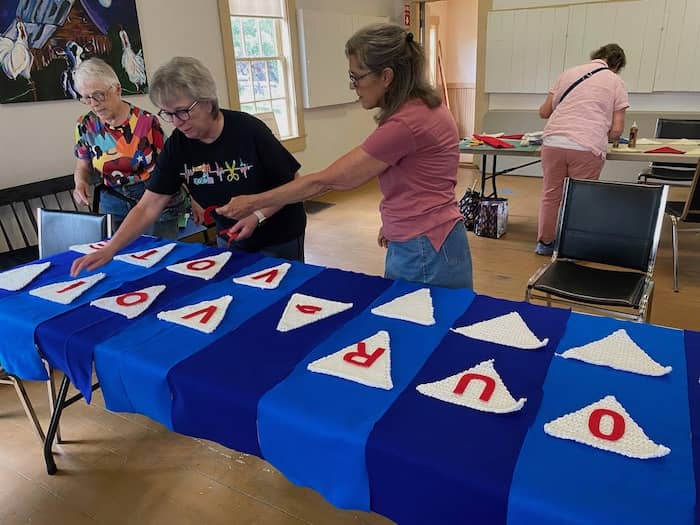On Tuesday, I helped create a parade banner from triangles knit and crocheted by participants in Knit Democracy Together sessions in the Mad River Valley. It’s going to be a great entry in the Warren Fourth of July Parade!
There were enough triangles left over to make decorations for the Mad River librarians’ carts in their book cart drill in the parade. (If you haven’t seen a library book cart drill in your hometown parade, just Google it.)
The banner spells out Your Voice = Your Vote. “At least, that’s what we hope happens,” said one person at the library. Unfortunately, the U.S. Supreme Court’s decisions destroying the Voting Rights Act have eroded that foundational democratic principle.
This week is the one-year anniversary of the Court’s decision in Dobbs v. Jackson Women’s Health Organization. That’s the decision reversing the 50-year-old precedent of Roe v. Wade, which protected a woman’s right to privacy in the decision to terminate a pregnancy within certain parameters. Dobbs represented the culmination of decades of activist political jurisprudence orchestrated by the Federalist Society.
What is the Federalist Society, you ask?
It’s a dark money organization that has been funding, promoting, and grooming judges to push a particular conservative and libertarian agenda. I’m not exaggerating. This talk by Sen. Sheldon Whitehouse (D-RI) explains how the group has built power and influence over the judiciary by picking judges, preparing them for confirmation hearings, and collecting on those investments by securing anti-regulation, anti-environment, and anti-reproductive freedom decisions.
The Dobbs decision was a wake-up call for many people in America, especially women. It laid bare the political agenda of the Court and exposed the falsity of the justices’ promises to respect precedent in their confirmation hearings.
In addition, recent revelations about Justices Clarence Thomas and Samuel Alito accepting lavish gifts from Federalist Society funders has renewed calls for court reform.
More people now see that the Supreme Court, like the two other branches of government, is political. The justices are humans, not saints or oracles. Their decisions are influenced by their religious beliefs, their life experiences, their friends, their surroundings, and, naturally, by the gifts they receive.
Rep. Hank Johnson (D-GA) has introduced legislation to require Supreme Court justices to adopt and follow a code of ethics, require disclosure of gifts and travel, and codify recusal standards. These are basic steps. The lower court judges in the federal judiciary are required to follow ethics rules to guard against conflicts of interest. There’s no reason the Supreme Court shouldn’t as well.
The proposed legislation is called the SCERT Act. (That’s a clever play on words, since “cert.” is what lawyers call the certiorari petitions that appellants file with the Court when they ask it to hear their case.) If you’d like, you can ask your U.S. Representatives and U.S. Senators to support the SCERT Act by sending them an email through the House or Senate contact forms.
I hope your Independence Day celebration is lots of fun! Along with parades, cook-outs, and ice cream, I’m going to find a moment to recall the courage and determination it took to sign the Declaration of Independence.


